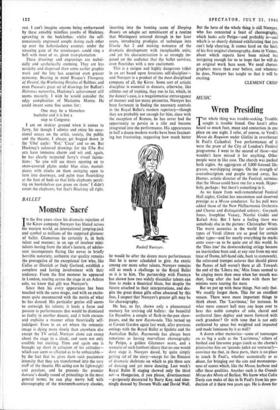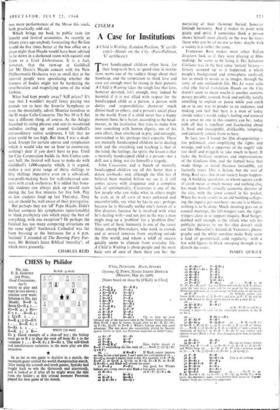Wren Presiding
MUSIC As we know from well-remembered Festival Hall nights, Giulini has uncommon and deserved prestige as a Messa conductor. To his pull were added those of the New Philharmonia Orchestra and Chorus and distinguished soloists : Gwyneth Jones, Josephine Veasey, Nicolai Gedda and Rafael Arie. But I have a feeling there was somebody else in the picture : Christopher Wren. The worst acoustics in the world for certain types of Verdi climax are so good for certain other types—and for nearly everything he marks solo voce—as to be quite out of this world. In the `Dies irae' the downrocketing strings became an inarticulate buzz and, at any rate from my seat (rear of Dome, left-hand side, back to stonework), the reiterated trumpet octaves that should pierce the flames of hell weren't there at all. Towards the end of the `Libera me,' Miss Jones seemed to be singing more than once when her mouth was shut; long after she had done with them her minims were touring the nave.
But we put up with these things. Not only that. We readily forgot them. This for an excellent reason. There were more important things to think about. The `Lacrimosa,' for instance. In what mere concert hall may one hope ever to hear this noble complex of solo, choral and orchestral lines deploy and move forward with such grandeur? Or with tone that is not only cushioned by space but weighted and impacted and made luminous by it as well?
A dozen other memories—some of tonescapes on as big a scale as the `Lacrimosa,' others of hushed and fearsome pages (such as the chorus's pianissimo hiss on 'quando judex est venturus1)-- convince me that, in these parts, there is no place to touch St Paul's,. whether acoustically or as décor, for bringing out the size and momentous- ness of scores which, like the Messa, harbour and offer these qualities. Another such is the Grande Messe des Morts of Berlioz. We know what Cohn Davis can make of this in St Paul's from his pro- duction of it there two years ago. He is down for two more performances of the Messe this week, both practically sold out.
Which brings me back to public taste (or hunch) and festival economics. As recently as fifteen years ago anybody forecasting that Berlioz would do five times better at the box office on a given night than Haydn would have been advised to lie down in a darkened room with equanil and listen to a Liszt Liebestratun. It is a fact, however, that the turn-up at Guildhall for Mr Davis's Haydn concert with the New Philharmonia Orchestra was so small that at the interval people were speculating whether the fewness of bodies might not be hardening the reverberation and magnifying some of the wind timbres.
What had kept people away? Stiff prices? It's true that I wouldn't myself fancy paying two pounds ten to hear the Surprise Symphony or even the musicianly, adroit Maurice Gendron in the D major Cello Concerto. The No. 99 in E flat was a different thing, of course. As the Adagio breathed its string phrases and sent its woodwind melodies curling up and around Guildhall's extraordinary votive sculptures, I felt that no price could be too high. But then, I was a dead- head. Except for certain operas and symphonies which it would take me an hour to enumerate, nothing's dear if you don't have to pay. Until the City Corporation builds its Arts Centre con- cert hall, the festival will have to make do with Guildhall's 1,000-capacity which, it is argued, makes a seat price range of thirty shillings to fifty shillings imperative even on a subsidised, non-profit-making basis for well-rehearsed con- certs with crack orchestras. It is added that bona- fide students can always pick up unsold seats during the last five minutes for five bob. Pity so few students lined up last Thursday. They are, or should be, well aware of their prerogative.
But perhaps they are 'off' Papa Haydn. Didn't Berlioz compare his symphonies (questionably) to 'sleek presbytery cats which enjoy the best of everything, with one exception'? Or perhaps the Festival has too many competing attractions on the same night? Southwark Cathedral was far from bursting at the buttresses for a 6 p.m. `matinee' I attended of The Burning Fiery Fur- nace, Mr Britten's latest Biblical 'morality': of which more presently.
CHARLES REID







































 Previous page
Previous page